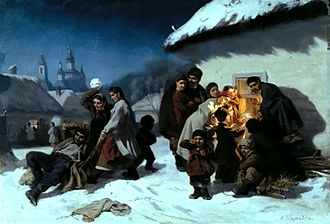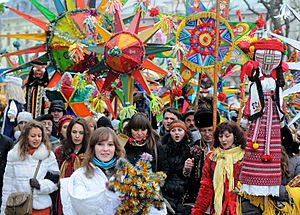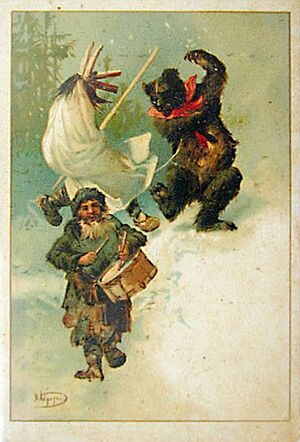Koliada facts for kids
Quick facts for kids Koliada |
|
|---|---|

Колядки в Малороссии (Christmas Carols in Little Russia) by K. Trutovsky
|
|
| Also called | Kolyada, Коледа, Kоляда, Коледе, Kalėda, Colindă |
| Observed by | Eastern European, Balts and Slavic people |
| Significance | celebration of New Year birth |
| Begins | January 6 |
| Ends | January 7 |
| Date | Lua error in Module:Wikidata at line 132: attempt to index field 'wikibase' (a nil value). |
| Related to | Christmas traditions, Eastern Orthodox liturgical days |
Koliada (also spelled koleda) is a special winter holiday celebrated by Slavic people in Eastern Europe. It's like a big festival that happens around Christmas time and goes until early January. Some parts of Koliada are very old, even from before Christianity. People celebrate it to welcome the new year and honor the sun as the days start getting longer after winter. A fun part of Koliada is when groups of people, often kids and teens, go from house to house singing special songs called carols.
Contents
What Koliada Means
The word "Koliada" is used in many different languages across Eastern Europe. You'll hear it in Ukrainian, Belarusian, Polish, Bulgarian, Macedonian, Serbo-Croatian, Lithuanian, Czech, Slovak, Slovene, and Romanian.
In many of these languages, the word "Koliada" or "kolęda" doesn't just mean the holiday itself. It also describes the fun tradition of walking around, singing, and having a good time on Christmas Eve. This is especially true for children and teenagers. They visit houses, greet people, sing songs, and sometimes even sprinkle grain for good luck. In return, they often get candy or a little bit of money.
Koliada Traditions in Different Countries
This tradition of singing and visiting houses has different names depending on the country:
- In Russia, it's called kolyadovanye.
- In Ukraine, it's called kolyaduvannya.
- In Bulgaria and North Macedonia, it's called koleduvane or koledarenje. The children who sing are called 'koledari' and their songs are called 'kolyadki'.
These traditions are also linked to other old holidays, like Generous Eve (the evening before New Year's Day) and even celebrations for the arrival of spring.
Koliada in Greece
Koleda is also celebrated in northern Greece by people who speak Slavic languages. There, it's called Koleda or Koleda Babo, which means "Koleda Grandmother." This celebration happens before Christmas. People gather in the village square, light a big bonfire, and then enjoy local Macedonian music and dancing.
Koliada in Arts and Culture
The holiday of Koliada has inspired artists too.
- A Croatian composer named Jakov Gotovac wrote a musical piece called "Koleda" in 1925. He described it as a "folk rite in five parts."
- In Dubrovnik, Croatia, the "Dubrovnik kolenda" is one of the oldest recorded traditions of its kind, first mentioned way back in the 13th century.
- There's even a dance from Dubrovnik called "The Dubrovnik Koleda."
See also
- Colindă, a similar Romanian/Moldovan tradition
- Korochun
- Crăciun (disambiguation)
- Twelfth Night (holiday)
- Yule
- Christmas carol
- Kolyadka
- Koledovanie
- Turoń
- Koleda (Koledovanie) in the Serbian tradition
- Kalenda Proclamation
- Shchedryk (song)
- Calennig
- Christmas Waits
- Beltane, Gaelic festival in honour of the sun



